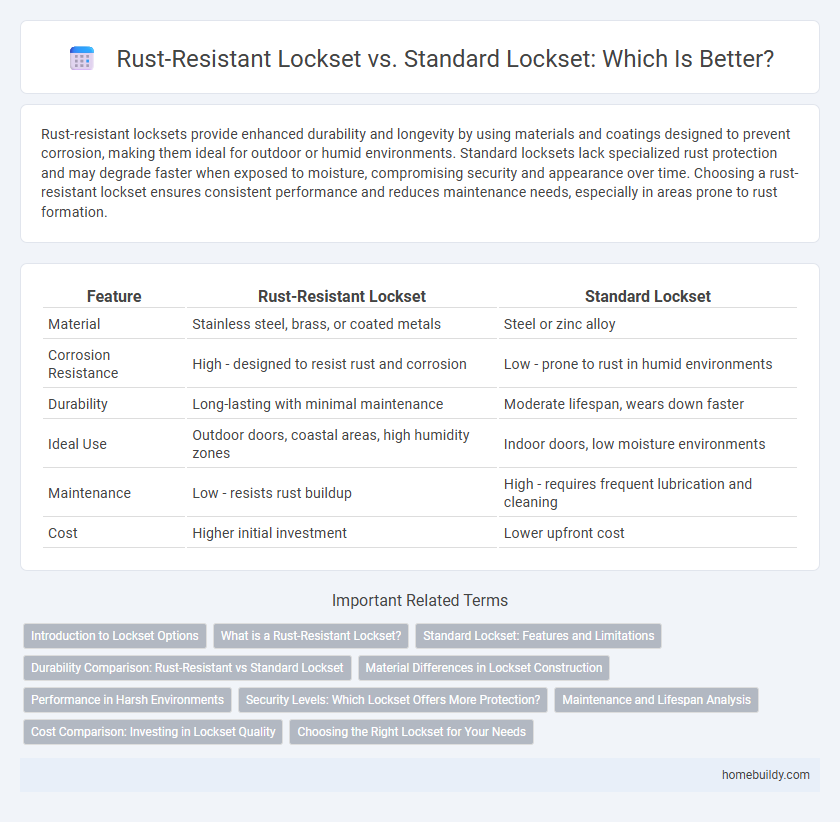Rust-resistant locksets provide enhanced durability and longevity by using materials and coatings designed to prevent corrosion, making them ideal for outdoor or humid environments. Standard locksets lack specialized rust protection and may degrade faster when exposed to moisture, compromising security and appearance over time. Choosing a rust-resistant lockset ensures consistent performance and reduces maintenance needs, especially in areas prone to rust formation.
Table of Comparison
| Feature | Rust-Resistant Lockset | Standard Lockset |
|---|---|---|
| Material | Stainless steel, brass, or coated metals | Steel or zinc alloy |
| Corrosion Resistance | High - designed to resist rust and corrosion | Low - prone to rust in humid environments |
| Durability | Long-lasting with minimal maintenance | Moderate lifespan, wears down faster |
| Ideal Use | Outdoor doors, coastal areas, high humidity zones | Indoor doors, low moisture environments |
| Maintenance | Low - resists rust buildup | High - requires frequent lubrication and cleaning |
| Cost | Higher initial investment | Lower upfront cost |
Introduction to Lockset Options
Rust-resistant locksets provide enhanced durability and corrosion resistance compared to standard locksets, making them ideal for exterior doors exposed to harsh weather conditions. These locksets typically feature materials such as stainless steel, brass, or specially coated metals that prevent rust formation over time. Choosing a rust-resistant lockset ensures long-lasting security and reduced maintenance in outdoor or humid environments.
What is a Rust-Resistant Lockset?
A rust-resistant lockset is designed using materials such as stainless steel, brass, or coated alloys that prevent corrosion and deterioration in humid or outdoor environments. Unlike standard locksets, which often contain untreated metals susceptible to oxidation, rust-resistant locksets maintain functionality and appearance over time. These locksets provide enhanced durability, making them ideal for coastal areas or locations exposed to moisture and harsh weather conditions.
Standard Lockset: Features and Limitations
Standard locksets typically feature materials such as brass, steel, or zinc alloys that provide basic security functions but lack advanced corrosion resistance. These locksets often show signs of rust and wear over time, especially in humid or coastal environments, which can compromise their durability and performance. Their limited resistance to environmental factors makes them less suitable for outdoor or high-moisture applications compared to rust-resistant locksets.
Durability Comparison: Rust-Resistant vs Standard Lockset
Rust-resistant locksets are engineered with materials like stainless steel or brass and coated with protective finishes to prevent corrosion, significantly enhancing their lifespan in moist or outdoor environments. Standard locksets, typically made from less corrosion-resistant metals, are prone to rust formation, which weakens internal components and reduces functionality over time. This durability difference makes rust-resistant locksets a superior choice for long-term security and low maintenance in environments exposed to humidity or adverse weather conditions.
Material Differences in Lockset Construction
Rust-resistant locksets are typically constructed using stainless steel, brass, or other corrosion-resistant alloys that provide superior durability in humid or outdoor environments. Standard locksets often utilize zinc or regular steel, which are more prone to oxidation and rust over time, leading to decreased lifespan and performance. Selecting rust-resistant materials enhances security and longevity, especially in coastal or high-moisture locations.
Performance in Harsh Environments
Rust-resistant locksets offer superior durability and longevity in harsh environments by effectively preventing corrosion caused by moisture, salt, and extreme weather conditions. These locksets maintain smooth operation and structural integrity where standard locksets commonly degrade due to rust and wear. Enhanced materials such as stainless steel or coated alloys significantly improve performance, reducing maintenance costs and failure rates in outdoor or coastal settings.
Security Levels: Which Lockset Offers More Protection?
Rust-resistant locksets provide enhanced security levels compared to standard locksets due to their durable materials that resist corrosion and wear, ensuring consistent performance over time. The integrity of a rust-resistant lockset reduces the risk of lock failure, maintaining higher protection against forced entry and environmental damage. Standard locksets, while functional, often suffer from material degradation that can weaken security features and compromise overall safety.
Maintenance and Lifespan Analysis
Rust-resistant locksets significantly reduce maintenance requirements by preventing corrosion, which extends the lifespan far beyond standard locksets typically made from untreated metals. Standard locksets often require regular lubrication and inspection to avoid rust-related damage that compromises functionality and security. Investing in rust-resistant materials ensures longer durability and lower overall maintenance costs in environments prone to moisture and harsh weather conditions.
Cost Comparison: Investing in Lockset Quality
Rust-resistant locksets typically cost 20-30% more than standard locksets due to their enhanced materials like stainless steel or brass, which provide long-term durability and corrosion resistance. Although initial expenses are higher, rust-resistant locksets reduce maintenance and replacement costs over time, delivering better value for environments prone to moisture or harsh weather. Standard locksets may seem budget-friendly upfront but often incur frequent repairs and replacements, leading to higher cumulative costs.
Choosing the Right Lockset for Your Needs
Rust-resistant locksets provide enhanced durability and corrosion protection, making them ideal for outdoor or humid environments where standard locksets may quickly deteriorate. Selecting the right lockset depends on factors such as exposure to weather, frequency of use, and security requirements. Prioritizing rust resistance extends the lifespan and maintains the functionality of locks in challenging conditions.
Rust-resistant Lockset vs Standard Lockset Infographic

 homebuildy.com
homebuildy.com